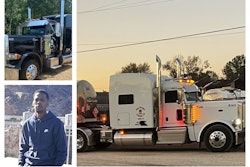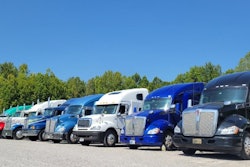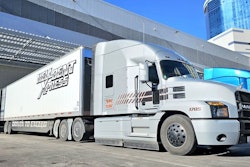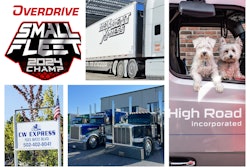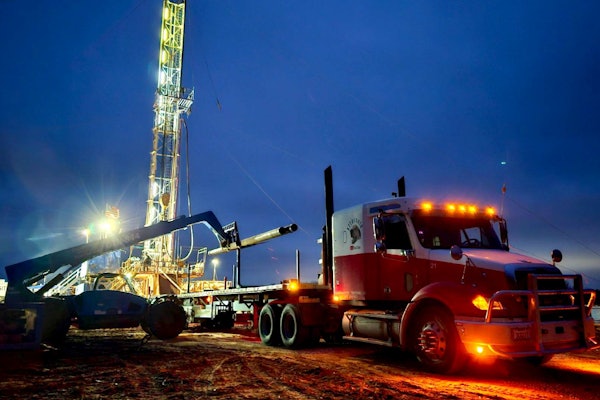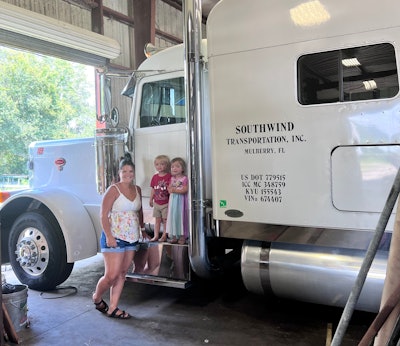
Mulberry, Florida-based Samantha Causey, owner of 12-truck Southwind Transportation, grew up around the business, which her uncle, Michael Hryc, started in 1998 when she was a child. Causey’s father, David Hryc, joined Michael part-time in 2000 while still working for Walmart as an operations manager at the Brooksville, Florida, distribution center.
In 2002, Michael was involved in a serious car accident that left him with brain damage, so David started running the business on his own full-time from then on. From the time David took over up through 2009, it was operated out of the Hryc house “in our dining room,” Samantha said, “so I kind of grew up in it. I worked in the office answering the phones and helping my mom do the billing and payroll and stuff like that when I was in high school.”
In 2009, David rented a small lot off U.S. 92 in Seffner, Florida, which the company called home base for about 10 years before moving to Mulberry, Florida, in 2018. “This property offered us more land for truck and trailer parking, and also a shop for repairs to be made on our equipment,” Causey said.
Causey had split from the family business after high school, however, attending the University of Central Florida for health service administration. “I had no intentions of ever coming on or working with my parents,” she said, “but my mom got sick in 2015, and I was finished in college and I got pregnant.”

All of it brought her back home to work with Southwind full-time.
 This is one of several Small Fleet Champ semi-finalist profiles that will air throughout this month. (Access all of the published profiles via this link.) Two finalists in each category (3-10 trucks, 11-30 trucks) will be announced in October.
This is one of several Small Fleet Champ semi-finalist profiles that will air throughout this month. (Access all of the published profiles via this link.) Two finalists in each category (3-10 trucks, 11-30 trucks) will be announced in October.
Her father, soon as he was diagnosed, Causey said, had “made it clear to me to be sure to always do what made me happy. He never wanted me to hold onto Southwind just because of his memory and legacy, but here we are."
 Causey keeps this life-size cardboard cutout of her father, David Hryc, in Southwind Transportation's office to honor his legacy with the company.
Causey keeps this life-size cardboard cutout of her father, David Hryc, in Southwind Transportation's office to honor his legacy with the company.
Causey, 33, has been running the business herself since her father's death. "There have been many days full of tears, some full of sweat, and lots of triumphs along the way," she said, "and I don’t think I would have it any other way. This company is my family, I was raised here, and I am doing the same with my three kids today.”
Her perseverance to get through the loss of her father and his hand on the business is but one reason Southwind Transportation is among the semi-finalists in the 11-30 truck division of Overdrive’s Small Fleet Championship.
Maintaining through chaos -- and the highest of highs, lowest of lows
Southwind Transportation's Samantha Causey has seen both the boom times and the bust, when it comes to freight, in her relatively short tenure at the helm of the business.
That's especially true considering roughly 98% of the fleet’s business runs through brokerages, some of the freight pure spot market loads. When her father, David, got sick in 2021, she'd just had twins and was taking care of them and her dad both. Aunt Kathy “was running all the drivers herself,” Causey said, and with a booming freight market at the time, some of the operators went out on their own and started their own businesses. Some others left for other companies. During her time atop the company, the fleet has downsized from 20 trucks to 12.
“And then we were just maintaining,” she said. “I’ve been maintaining the 12 guys, and I’m just starting to look to expand at this point because things seem to be leveling out and getting a smidge better.”
Most of Southwind’s freight is reefer freight, either produce or frozen goods. A couple of the company’s drivers also pull a dry van hauling dry food, auto parts and more.
 The view from Southwind headquarters paints a picturesque scene daily.
The view from Southwind headquarters paints a picturesque scene daily.
“It’s really tough to get in with these guys,” Causey said. “My selling point is that you know who you’re going to be speaking to if you work with us. We are all family.”
She said a few of her 12 drivers have been with Southwind for a decade, about half for at least 5 years.
“So what’s nice is I can send in the same guys," she said. Customers get "to know them. Those are my big selling points that I try to use. I send in my own equipment. I can recover loads myself, I don’t have problems.”
[Related: C.W. Express invests for new growth with team-building prowess, operational expertise]
Whit Hewes, founder of the Alstar Logistics brokerage, said Causey and Southwind “haul inbound and outbound freight for one of my customers in Georgia.” He said the company does a “wonderful job and are very easy to work with.”
Causey and her drivers “stay in communication with me from start to finish, so that always helps if there’s a problem,” he added, though problems have been more or less nonexistent since he's been dealing with Southwind.
Poor freight markets of the last couple of years have limited equipment investment, Causey said. To date, she’s focused on maintaining the paid-off equipment that she has. It helped that her father made it a practice to pay cash for most of it, she added. She's worked hard to maintaining those trucks “to get the most efficiency out of what we have, so I can focus on our operations and keeping the doors open.”
Of the 12 trucks in the fleet, three of them Causey and Southwind own -- 2001 and 2006 Freightliner Columbias, and a 2015 Freightliner Cascadia. The other nine trucks and drivers are leased owner-operators, to whom she offers a hand when OTR maintenance issues rear their heads in the form of a breakdown.
“They can’t afford these big repairs,” she said, adding that often enough she covers the cost of the repair and works out a deal with the owner-operator to pay her back over time. “At the end of the week, I call them and we work out what they’re going to do. ... They have families to feed, too. Everybody’s just working to feed their families, so I do the best I can. What I can afford to give them, I do.”
In the event an operator's stranded, for instance, she's paid to have the trucks towed back to home base to be repaired at the company’s shop, which employs two in-house mechanics.
“I’m just pinching pennies and making sure that I have the money here to keep the doors open and keep everybody paid," she said. "That’s been my main focus.”
Causey and Southwind also own 18 trailers.
Focus on safety, maintenance key to success
 From the Southwind Transportation archives, a photo from a drivers' meeting several years ago.
From the Southwind Transportation archives, a photo from a drivers' meeting several years ago.
Southwind’s drivers typically haul produce out of Florida through the Central U.S., out to Texas, up to Minnesota, Iowa, Wisconsin, and everywhere in between, “and then we work them back down” to Florida, Causey said.
Operators typically stay out for about eight days, then reset hours at home.
For the owner-operators Causey leases on, her main requirement for equipment is that it be roadworthy.
“I’m a Satisfactory carrier,” she said of the company's safety rating. “I’ve worked really hard on maintaining that score the last few years.”
Before her father passed away, she primarily focused on safety and compliance, along with payroll and billing. In taking over the business, she still keeps a focus on those areas, in addition to managing the day-to-day operations, she said.
“That side of it isn’t new to me, but I do just want everything to be roadworthy,” she added.
An in-house Southwind mechanic inspects every truck when it comes through home base, including those of owner-operators leased on. For them, if the mechanic catches something, “it’s a requirement that it gets fixed," Causey said. "I don’t push them too hard," but her "expectations are that everything is roadworthy and within legal operations.”
The fleet stocks parts at their shop -- tires, bushings and more. "I look for the deals, and I buy it when I can get it cheap,” she said. The two in-house mechanics split PM duties -- one responsible for all 18 trailers, the other the trucks and bigger repairs, even engine overhauls and similarly in-depth work if necessary.
 The National Association of Small Trucking Companies is sponsoring this year's Small Fleet Championship program. Finalists receive a year's worth of membership in the association, with access to a myriad of benefits from NASTC's well-known fuel program to drug and alcohol testing services and much more. All will be recognized at the association's annual conference, where the winner will be announced in November in Nashville, Tennessee. Find more about the association via their website.
The National Association of Small Trucking Companies is sponsoring this year's Small Fleet Championship program. Finalists receive a year's worth of membership in the association, with access to a myriad of benefits from NASTC's well-known fuel program to drug and alcohol testing services and much more. All will be recognized at the association's annual conference, where the winner will be announced in November in Nashville, Tennessee. Find more about the association via their website.
Southwind’s 30% covers on-site parking, mechanics, fuel cards, IFTA and insurance. “There’s no hidden fees,” she said. “It’s a clean 70-30 split. There’s no other deductions out of their checks.”
With her diligent maintenance of the business these last years, along with new direct freight and what she sees as positive market signs of late, speaking in August she said she planned to get a couple new reefer trailers in the coming weeks to start a bit of a fleet refresh that could also yield growth.
The oldest reefer trailers "that I have are 2009 [models], so they’re kind of phasing out,” she said. “We have given them a good run for their money, but it’s time to get some upgrades."
She's hopeful for the immediate near- and longer-term, she said. "I’m hoping I’m going to get a couple of new owner-operators and a couple of new reefer trailers to get some equipment back on the road and keep things rolling.”
[Related: From $13/mile loads in a 'zombie' truck to stability, growth: Evolution of Dana Gardner Trucking]

